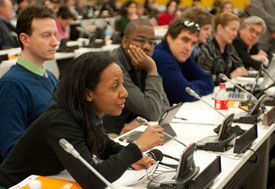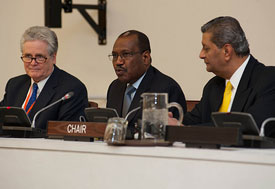GETHealth summit 2013 mulls widening technology use
January / February 2013 | Volume 12, Issue 2
Wider use of information communication technology (ICT) could greatly improve health care provider education and research capacity in developing countries, but there are many challenges to making this happen. To discuss how to overcome the barriers and accelerate change, leaders in health, research, education and ICT gathered recently in New York for the Global Education and Technology Health (GETHealth) summit.

Photo courtesy of Johns Hopkins University
Attendees at the GETHealth summit shared ideas about
how to accelerate use of mobile technologies in
developing countries.
"There was a lot of enthusiasm for identifying ways to better harness ICT to train and strengthen the health and research workforce in low-resource countries," said Fogarty's Nalini Anand, who moderated a conference session. "The challenges are many, for instance, how to keep nimble enough to adapt to new technologies over time and how to get more senior faculty on board and innovating. It's daunting, but that doesn't mean it's not worth exploring."
The meeting brought together experts from many different disciplines, ranging from global health researchers to curricula developers to software manufacturers. Attendees shared their models for how to implement distance learning, integrate ICT in health care delivery and encourage global health education and research training in-country. Other themes included gender empowerment, public-private partnerships and the use of social networks in health care delivery.

Photo courtesy of Johns Hopkins University
The GETHealth Summit, chaired by Dr. Robert C. Bollinger
(on left), focused on improving health education and
research capacity with online resources.
Attendees shared examples of successes. In a telemedicine initiative in Zambia, local health workers were trained to apply vinegar to a woman's cervix, which turns cancerous cells white, then take a digital photo and transmit it to an expert for diagnosis. Another example involved Tufts University's TUSK learning management information system, a software platform that facilitates teacher and student online communication and access to multimedia materials, correspondence, lecture notes, conferences and other e-learning tools. A Fogarty Framework grant helped support an initiative to extend the use of TUSK to developing countries.
Fogarty was a partner in the summit, convened by the Johns Hopkins Center for Clinical Global Health Education and the U.N. Global Partnerships Forum, and co-hosted by Ethiopia, Norway, Rwanda and Uganda.
In follow-up to the meeting, organizers will publish proceedings and set up social networking to further encourage discussion on the topic. "The summit helped to gain more awareness of different initiatives and actions that are already going on," Anand said. "That will help us think strategically about what value we can add and where."
More Information
To view Adobe PDF files,
download current, free accessible plug-ins from Adobe's website.